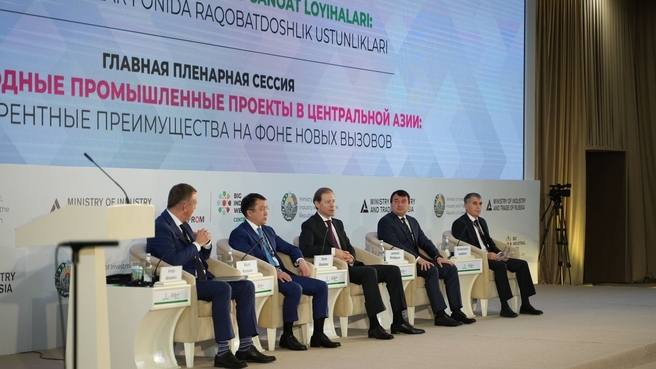Russian Deputy Prime Minister and Minister of Industry and Trade Denis Manturov visited the Innoprom Central Asia exhibition and took part in the plenary session. Deputy Prime Minister of the Republic of Uzbekistan Jamshid Khodzhayev, Minister of Industry and Infrastructure Development of the Republic of Kazakhstan Marat Karabayev, and First Deputy Minister of Industry and New Technologies of the Republic of Tajikistan Isojon Kurbonzoda also took part in the session.
Opening the main plenary session called ‘International industrial projects in Central Asia: Competitive advantages amid new challenges,’ Deputy Prime Minister of the Republic of Uzbekistan Jamshid Khodzhayev noted: “Our cooperation should be exemplary because we have tremendous potential in industrial cooperation. For example, we see major prospects in the food, agro-industrial, textile and chemical sectors and the construction materials industry. It is necessary to step up our efforts to create high-tech joint production facilities and to expand our cooperation in manufacturing products in high demand and in developing markets in third countries.”
Denis Manturov read a message of greetings from President of Russia Vladimir Putin, noting, “Regional economic cooperation processes are showing very high dynamics. Indicative in this regard is the speed at which interaction between the host countries, Russia and Uzbekistan, is developing; bilateral trade grew by more than a quarter last year.”
The Russian Deputy Prime Minister noted that the Innoprom event in Tashkent encompassed issues of Central Asian industrial development, and that it was important to expand cooperation with all regional states in a well-balanced manner.
“We have joint projects or long-term plans in every industrial sector. Regulators need to ensure that businesses will be able to realise their potential in full. The number of participants at the exhibition (over 300 companies) reflects the business community’s interest,” Denis Manturov noted.
He added that Russian industry was now moving to achieve technological sovereignty, but that the country would not become isolated again.
“We see cooperation opportunities and ties within the framework of associations where we can expand our trade and economic relations. This includes the EAEU, the SCO, BRICS and other economic associations where we are forging normal, friendly and constructive relations. This will help achieve technological sovereignty, and Central Asia holds a leading position in this respect. I can mention some statistics as an example: trade volumes increased by 15 percent last year over 2021. Our trade volumes with the Central Asian countries topped $42 billion, including $28 billion with Kazakhstan and about $9 billion with Uzbekistan. <…> I am confident that these trends will continue in the future,” Denis Manturov noted.









